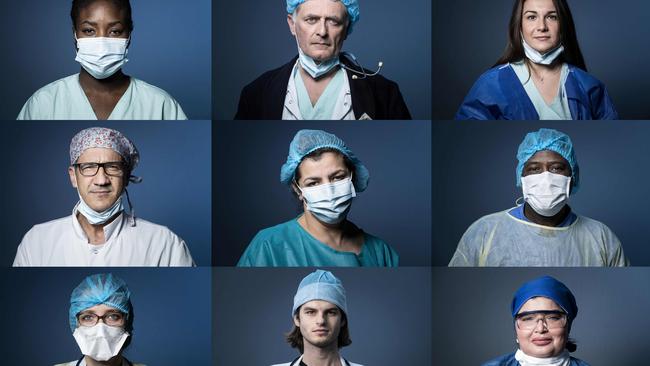CSL global alliance speeds immunotherapy against COVID-19
Trials of potentially life-saving therapy for COVID-19 are expected to be fast-tracked by a global pharma alliance.

Biotechnology company CSL has weighed into the global race to fight the coronavirus by partnering with Japan’s Takeda Pharmaceutical Company to develop an old-fashioned but potentially life-saving treatment.
CSL, which is now the biggest company on the ASX, joined forces with Takeda to accelerate development of plasma-derived therapy to combat lethal complications of COVID-19.
The treatment, which will need regulatory approval, involves extracting antibodies from the plasma of people who have recovered from COVID-19 todeveloping a hyperimmune immunoglobulin medicine.
CSL and Takeda will leverage their knowhow and work that is already under way to combat the virus.
Clinical trials of unbranded hyperimmune serum could begin “within months”, CSL chief scientific officer Andrew Cuthbertson said. An effective vaccine able to protect the entire population takes at least 12 months to develop.
Professor Cuthbertson said well-designed trials would guide decisions about who would be first in the queue for serum treatment, which is based on “borrowing” the antibodies of patients whose immune systems have fought off the viral illness.
“Probably people who are very high risk, maybe people who are infected and getting worse and heading for the intensive care unit, possibly in the ICU.
“It could also be used as a preventative treatment if someone coughed right into the face of a health worker.”
Debate on priorities
He said priorities for eligibility in trials and for treatment would involve “great debate”.
“It’s a matter of how do we best use these precious initial vials of this medicine, because we won’t be able to make enough to protect the entire population — you need a vaccine to do that.”
The global pooling of expertise and resources for the manufacture of the hyperimmune treatment was announced on Monday night, with CSL subsidiary CSL Behring and Takeda joined by the German-headquartered Biotest, LFB (France), Octapharma (Switzerland) and Bio Products Laboratory (Britain).
The humanitarian alliance between commercial rivals is open to other firms and plans to work with governments.
“Unprecedented times call for bold moves,” said Julie Kim, president of Takeda’s Plasma-Derived Therapies Business Unit.
Professor Cuthbertson said he expected clinical trials in the northern hemisphere and Australia could start in parallel, with sharing of data and insights speeding up progress.
He said local trials might require 100 to 500 donors, and would require the development of tests enabling identification of the best donors and the potency of antibodies against the illness.
CSL was in talks with the federal Health Department, regulator Therapeutic Goods Administration, research partners including the Melbourne-based Peter Doherty Institute for Infection and Immunology, and plasma collection agency the Australian Red Cross Lifeblood to get trials on foot as soon as possible.
There are 5000-plus people known to be infected with SARS-CoV-2, the virus that causes the disease COVID-19, and Professor Cuthbertson said it might require anything from five to 10 donors to produce enough serum to treat a single sick person.
The distressingly large number of patients in the US and parts of Europe would drive the northern hemisphere trials, ensure government support and generate useful knowledge.
The hyperimmune therapy would be a safer industrial-scale version of the basic passive immunisation treatment begun as an emergency trial in New York, whereby “convalescent serum” from recovered patients is screened, then given directly to the critically ill by intravenous transfusion.
Already used with encouraging early results on a small scale in Shenzen, China, this technique dates back to the 1890s and is the fastest to deploy of all passive immunisation methods but cannot treat many patients.
Professor Cuthbertson said it was “logical” that convalescent serum would work with COVID-19 but as yet nobody had done clinical trials to confirm this definitively.
He said the alliance’s hyperimmune serum relied on the same donors as the basic, emergency approach being used in New York, but the collection and manufacturing process would bring more stringent safety and produce reliable medicine on a large scale.
“So we know what’s exactly in the vial (of hyperimmune serum), we know that it’s safe, we know it’s standardised and reliable,” he said.
“We know we can do this at scale — so we could treat hundreds, potentially thousands rather than one (at a time).”
Precise targeting
The Doherty Institute is developing a passive vaccine against the virus using a different technology targeting “monoclonal” antibodies, and hopes this can this be ready for mass production within 2-3 months.
Institute virologist Damian Purcell said this passive immunisation could protect frontline health workers against the virus for “up to six months” as a stopgap while work to develop active vaccines continues.
“Those people need to have something more than masks, gloves and a face shield,” Professor Purcell said.
Professor Cuthbertson said it made sense to push ahead with both the monoclonal route and the polyclonal path pursued by the alliance.
“The polyclonal approach is faster, it means that you have multiple shots on goal with multiple antibodies to block the virus, but it does rely on access to convalescent plasma donors,” he said.
The government of NSW, home to almost half the known infections, played down the value of convalescent plasma to protect frontline staff.
A spokeswoman said NSW Health was aware of the research overseas but pointed out this basic plasma therapy might give immunity for as little as three weeks.
However, Professor Purcell said the advanced technique used by the Doherty institute — molecular engineering of monoclonal antibodies — could lead to protection for as long as six months.



To join the conversation, please log in. Don't have an account? Register
Join the conversation, you are commenting as Logout